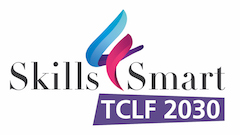On Tuesday 3rd of November 2020, the Skills 4 Smart project partners launched a webinar under the European Vocational Skills week, which brought together more than 100 participants interested in the outcomes of the series of online workshops that were held by the project in September and October 2020.
During the webinar, project partners presented for the first time the conclusions from the analysis focused on the impact of the COVID-19 on VET providers in TCLF industries. Likewise, they presented the results of the survey conducted with European VET providers which aimed at establishing the first steps to develop a Network and to discover the opportunities created for the industry by the European Commission under the Pact for Skills initiative.
Increasing the attractiveness of TCLF industries is an urgent need
Iratxe Garcia, Senior Project Officer at EURATEX (European Apparel and Textile Confederation), was the first speaker of the webinar, focusing her intervention on the objectives of the project and the Blueprint initiative of the European Commission.
In her presentation, she emphasised the project’s objective of upgrading the image of career opportunities in the TCLF sectors to attract new workers, especially youngsters. Indeed, the total number of employees in the TCLF industries in 2019 was 2,1 MLN, out of which 34% are over the age of 50. To attract workers and strengthen the TCLF community, different actions and tasks are defined by the consortium: the development of a promotional plan to attract youngsters, a study of best practices for recruitment & employment in the TCLF sectors, the creation of a network that supports and promote skills development and employment in TCLF, and the creation of a network of VET providers in TCLF sectors to promote excellence.
A European perspective on covid-19 and transnational collaboration
Christian Baio, Project Manager & Business development at Spin 360, took over the floor to present the current challenges that education faces in Europe as a consequence of the coronavirus pandemic. The numbers presented were based on the online workshops conducted in September and October, which aimed at analysing what solutions have been put in place by VET providers to face the crisis.
From the implications of COVID-19 on education, 5 main key challenges emerged: enhance digital teaching, keep students and apprentices engaged, support the most vulnerable learners, grade and assess students, and deliver on-the-job training in the distance. In particular, the challenges named by the participants regarding the delivery of teaching activities were: delivering practical training in the distance, supporting the most vulnerable learners, infrastructure issues at home, limited digital skills of trainers, and extra costs for the protective equipment.
VET centers’ response to the pandemic depends on their human and digital resources, their level of autonomy, the flexibility of national regulation and authorities’ support, and the collaboration with the regional stakeholders. However, a specific VET center’s best practice could not be suitable for others. It is important to leverage all the possible aspects highlighted above to put into practice a holistic and all-encompassing strategy in times of crisis.
Based on the results of the conducted survey, it is clear that VET providers are trying to manage the crisis in adequate way. According to the change curve, VET Providers are in the conscious phase. They also said that at the end of the crisis, the improvement will be better than in the past.
How can a network improve TCLF VET collaboration in Europe?
Paul Lasserre, Policy and Communication Assistant at the European Footwear Confederation (CEC), during the webinar, presented the results of an online survey launched among VET providers that aimed at analysing the needs and potential of future collaboration within the TCLF industry in Europe. The key takeaways from that research are the following:
– Collaboration activities are already being carried out by VET providers from our sample, but further collaboration within a Network promoting excellence in VET would increase the opportunities to grow as a smart VET provider.
– Being part of a network seems to have a positive impact on collaboration: our findings show that it increases the scope of collaboration activities. VET providers that are part of a network are more likely to collaborate with a greater diversity of TCLF actors.
– Because being part of a Network means creating ties between many different players, it will allow VET providers to reap the benefits of collaboration, minimise the obstacles they currently encounter and ultimately create a propitious substrate to better respond to needs in terms of education, TCLF competitiveness, and regional growth.
Paving the way towards a European network of TCLF industries VET providers promoting excellence
Carmen Arias, General Secretary of the European Footwear Confederation (CEC), focused her presentation on the opportunities and new initiatives launched by the European Commission that are in line with the investment priorities of VET representatives: digital teaching and learning methodologies, professional education of teachers and trainers through mobility and co-organisation of events to promote the VET studies on European/transnational level.
Participants of the webinar had a unique opportunity to learn about upcoming actions proposed by the European Commission under the recently launched European Skills Agenda, EU Recovery Package, EU Cohesion Policy (namely Smart Specialisation Strategies), or Erasmus + programme. Only by understanding well the offer, the industry can contribute to the Network of TCLF VET providers promoting excellence, whose key action points were presented during the webinar.
Carmen Arias’ presentation finalized with a discussion about the next steps for the TCLF VET providers that are interested in collaborating under the Skills4Smart TCLF project, that includes activities oriented to an exchange of best practices and information about available EU funding, submission of an expression of interest with an indication of priority actions and signature of a Memorandum of Understanding.
Want to know more details? Please contact our project coordinator Iratxe Garcia-Bayona (iratxe.garcia@euratex.eu)


